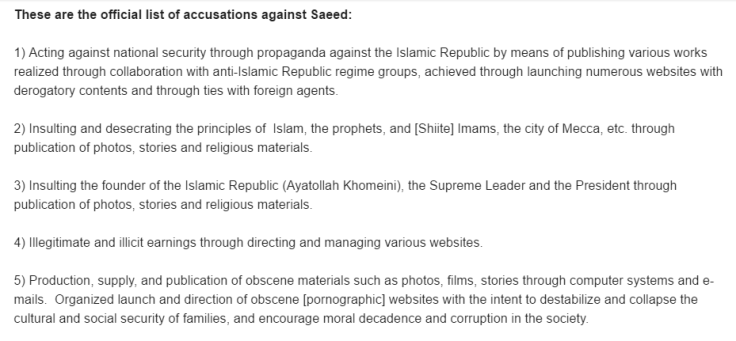How Iran's war on internet freedom saw a web developer branded a paedophile and jailed for life
Saeed Malekpour was made an example of to silence a generation – but Justin Trudeau has the power to free him.

October 4 marked eight years since the life of Iranian web developer Saeed Malekpour turned into a nightmare. Saeed Malekpour is a graduate of Iran's prestigious Sharif University, and a permanent Canadian resident who was pursuing a PhD in Canada.
On that day in 2008, while visiting Iran to see his sick father, Saeed was snatched from a Tehran street in broad daylight and stuffed into the back of a car. He was blindfolded, beaten, and then taken to a detention centre to be brutally tortured both physically and psychologically. His torturers said they wouldn't stop torturing him until he "confessed". The bizarre crime he was asked to confess to? "Running a network of porn sites".
Saeed had no idea what they were talking about, or why they would accuse him – in particular – of such a thing. He was unfortunate enough to be a freelance web developer and open-source programmer in 2008 – the same year in which the blogging scene peaked in Iran, and the same year the Iranian regime decided to "fight back" against the right of Iranians for free expression, by creating their own "cyber army".
His story illustrates how repressive regimes are threatened by the internet as an alternative public sphere, and to what lengths they would go to clamp down on it.
Right from its introduction in the early 2000s, the internet was very popular in Iran; by 2008, Iran had a vibrant, active blogging scene. Iranians saw the internet – and blogging – as a new opportunity to exercise their right to freedom of speech and expression. The Iranian regime – as expected – felt threatened by the Iranian blogging boom, especially with the 2009 Iran elections round the corner.
Just like neighbouring repressive Arab regimes, there is nothing the Iranian regime fears more than its own people. In 2008, the Iranian Revolutionary Guard Corps (IRGC) established a "cyber army" tasked with clamping down on the internet, funded by Supreme Leader Ayatollah Khamenei.
They not only forced Saeed to confess to "running a network of porn sites", but also that he was a pedophile and a pervert.
The IRGC needed a grand narrative to justify their assault on the internet – unsurprisingly and almost boringly, it was that the internet is an "imperialist" Western tool to "spread debauchery" in Iran, through corrupt Western-funded "agents" and "proxies".
Conveniently enough for the IRGC, with the internet came pornography, also (unsurprisingly) popular in Iran. In the same way that Western governments often assault internet freedom for the cause of "national security", Middle Eastern ones often do so for the cause of "protecting morality". Be it Saudi Arabia, Iran, or the UAE, it starts with "we want to protect society from porn" and ends with jailed bloggers and exiled activists.
The IRGC "cyber army" went to work "cleaning up Iran's internet of porn" to "protect morality" and "the values of the Islamic Republic". They needed a good fall guy, someone to publicly make an example out of, and unfortunately for Saeed Malekpour, he fit the profile; a Western-educated, Iranian techie who is pursuing a life and education in a Western country.
Saeed didn't know why he was arrested until he was told that his name appeared in code on a "porn site" that the IRGC had taken down. Saeed insisted that he had nothing to do with the site – but he couldn't withstand the torture.
A freelance web developer and open-source programmer, Saeed regularly posted open-source code snippets on his personal blog. The IRGC used his open-source code as an excuse to torture him into a confession, under the pretext that his code was used by the porn site's programmers. In fact, they not only forced Saeed to confess to "running a network of porn sites", but also that he was a paedophile and a pervert. Portraying him in this way was important for their narrative – "look at what happens when Iranians go to the West, they get corrupted".
Saeed's torturers extracted hours of recorded confessions from him, then used them against him the most inhumane way possible. Months after his arrest they informed him that his father, who he had been in Iran to visit, had passed away from his illness. On the night of his father's funeral ceremony – which of course Saeed couldn't attend – Iran's state TV aired Saeed's forced confessions. Saeed's mother was so distressed that she suffered a heart attack that very night.
Saeed would stay in jail for over a year before being brought before a court. In a sham trial that lasted no more than a few minutes, he was sentenced to death for a ridiculous list of charges:

There was no evidence against Saeed – certainly nothing to justify the ridiculous list of charges or the death sentence – than the forced confessions extracted under torture (curiously enough, even the code snippets purportedly showing his name were never presented in court). After international uproar, he was retried, only to be sentenced to death again in a similar trial. Eventually, his trial was commuted to a life sentence, which he continues to serve today in Iran's notorious Evin Prison.
He was made an example out of, in order to silence an entire generation of Iranian bloggers and techies.
The IRGC are well aware that Saeed Malekpour is not the mastermind behind a network of porn sites, but he fits their narrative very well. The mission of their cyber army is to scare Iranians away from expressing themselves openly online – there is, after all, nothing scarier to a dictatorship than a society freely expressing itself, and they know no better way to face it than brutality. By arresting, torturing, and threatening to execute Saeed Malekpour, the Iranian regime sent a strong warning to Iranians. Today Iran's prisons are filled with bloggers, journalists, online activists, social-media users, and web developers like Saeed.
When the UAE authorities arrested and expelled me for my online activism, they wanted to make an example out of me too. By going after one of the most highly visible tweeps, they silenced scores of accounts – it worked phenomenally well, with many getting scared into putting an end to their online activism, or even closing their social media accounts altogether. I see a clear and far more brutal parallel in Saeed Malekpour's story – he was made an example out of, in order to silence an entire generation of Iranian bloggers and techies.
The Iranian regime will not release Saeed until he becomes a big enough liability. As a Canadian permanent resident and someone who was pursuing a life and education in Canada, it's up to Canadian PM Justin Trudeau to make that happen. Trudeau's administration has committed to re-normalising relations with Iran, but Saeed's life should not be the price for that. I take this opportunity to invite every person of conscience to sign this online petition to remind Justin Trudeau that he has the power to fight for Saeed's freedom.
Iyad el-Baghdadi is a career entrepreneur, Civita fellow, writer and Arab Spring activist. Follow him on Twitter: @iyad_elbaghdadi
© Copyright IBTimes 2025. All rights reserved.






















